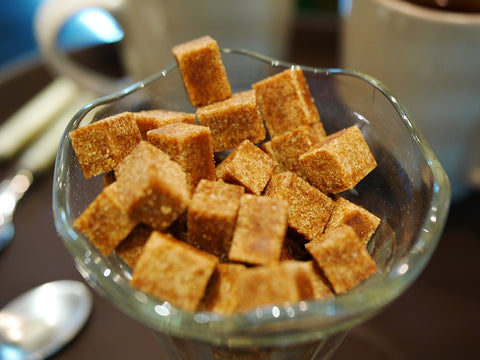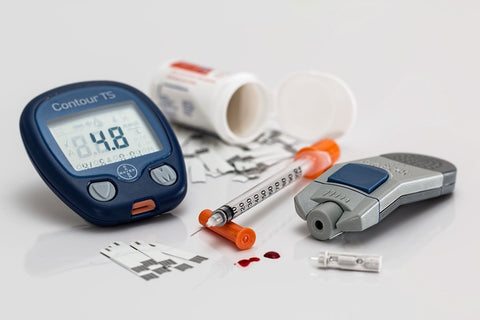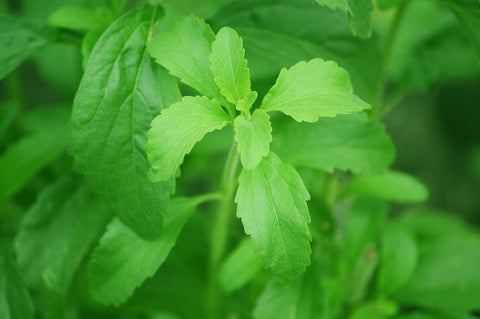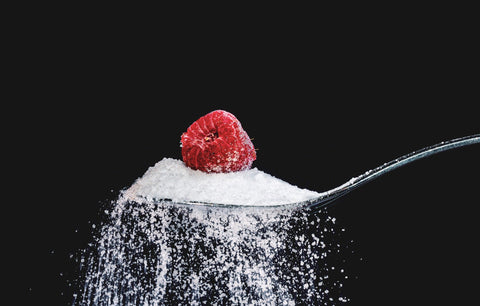
Sugar Alternatives: Everything You Need To Know
If you're looking to improve your health, trying to change your diet, or are in need of a way to control your blood sugar levels, you may be looking for a suitable sugar substitute. With so many different sugar substitutes on the market these days, it can be hard to know which to choose and which is best for your health.
In this article, we're going to be explaining everything you need to know about sugar alternatives, including the different types, their health benefits, and which substitutes you can use for each kind of sugar.
We've done all of the research so why not check out the rest of this blog post and learn everything you need to know about sugar alternatives now.
What is a sugar substitute?
In a world of refined foods, sugary drinks, and processed snacks, it's difficult to curb your sugar intake. If you're trying to understand more about how much sugar you consume and what you can do about it, then you have probably come across a range of sugar substitutes.
A sugar substitute is a substance that is used to sweeten or enhance the flavour of food. It can be chemical or plant-based and is usually a lot sweeter than regular sugar. Some sweeteners have lower calories than sugar, with a few having next to no calories. Other sugar substitutes may have a calorie content closer to that of sugar.
Sugar substitutes can be used as tabletop sweeteners, in hot drinks for example, and can be used in cooking and baking. Getting the right substitute for the sugar in your recipe is key to keeping the desired flavour.
Why do we use sugar substitutes?
So, why do we use them? What can sugar substitutes offer us that table sugar can't?
In some cases, people use sugar alternatives to reduce their calorific intake. This may be to help with healthy weight loss, or as part of specific diets. For others, the use of a sugar substitute, particularly a natural sweetener, is to enhance the food with nutrients as, unlike table sugar, many natural alternatives contain essential vitamins and minerals.
In addition, some may choose a sugar alternative to limit their sugar intake and control their blood sugar better. The glycemic index of sugar substitutes may vary, meaning those who need to control their blood sugar levels, like those with diabetes, may choose alternatives with a lower glycemic index.

Are sugar alternatives healthier?
Though sugar alternatives can offer more vitamins and essential nutrients and fewer calories, in some cases, there are still questions as to whether sugar alternatives are healthier than table sugar.
Table sugar, or white sugar, offers us next to no nutritional value except for carbohydrates. These are generally burned through quickly in what is known as a sugar high, and then the body will crash. Brown sugar, offering slightly more in the way of micronutrients due to its molasses content, isn't much better, though is the healthier option of the two.
For sugar substitutes, the health benefits vary depending on the type of sugar substitute it is. There are four different types and below we have summarised each and discussed their health benefits. Check it out now to find out more.
Natural sweeteners
Natural sweeteners usually include things like honey, maple syrup, agave nectar, and other forms of sugar that haven't undergone the processing and refinement that white sugar has. Natural sweeteners are considered natural because they aren't as refined as table sugar, though they are still classed as added sugar.
Natural sweeteners usually contain some essential nutrients due to their unrefined state, but be aware that 'natural' may be used on labelling where a product has still undergone some refinement.
Natural sweeteners are broken down in the body into sucrose and fructose, like table sugar, meaning they are only considered healthier than table sugar because of the small nutrient content they may have. Natural sweeteners frequently have the same or higher calorific value than table sugar and should be consumed in moderation, much the same as table sugar.
Artificial sweetener
Artificial sweeteners are chemically made and meant to resemble sugar. Artificial sweeteners include sucralose, saccharine, and aspartame. They have no calories at all, are many times sweeter than sugar, and do not increase blood sugar levels after consumption. Artificial sweeteners are commonly found in sugar-free products.
Though artificial sweeteners offer a calorie-free way to sweeten food and are helpful in those who need to control blood sugar levels, artificial sweeteners may come with some negative side effects. Some research suggests excessive consumption of artificial sweeteners can be linked to excess belly fat and weight gain. In addition, these sweeteners could disrupt gut bacteria, affecting digestive function, and consumption may increase the risk of developing type 2 diabetes.

Aspartame, in particular, has been subject to lots of research which shows that this artificial sweetener may be linked to a range of serious health conditions, including strokes, cardiovascular disease, and neurodegenerative diseases like Alzheimer's and dementia. Aspartame is also known to cause mood disorders, headaches and migraines. This artificial sweetener is probably best avoided and other, safer artificial sweeteners are used instead.
Aspartame is found frequently in chewing gum and so finding chewing gum that uses xylitol, rather than aspartame is a good idea.
Sugar alcohols
Sugar alcohols, or polyols, are a hybrid of a sugar molecule and an alcohol molecule. Some sugar alcohols are found naturally in food, like sorbitol and erythritol, but many are manufactured.
Sugar alcohols are considered low-calorie sweeteners and are about 25 - 100% as sweet as sugar. They don't cause tooth decay or raise blood sugar levels as table sugar does, and they are considered low-digestible carbs, meaning they are not fully absorbed by your intestines. Some sugar alcohols may improve digestive function by promoting the growth of good bacteria.
Most sugar alcohols rank with a low glycemic index in comparison to table sugar, meaning your blood sugar levels will not spike after consumption. However, sugar alcohols can cause bloating and diarrhea if consumed excessively.

Novel sweeteners
Novel sweeteners are more difficult to classify. They tend to come from natural sources but are highly refined, the most popular of which is Stevia.
Stevia comes with a number of health benefits and is quite a lot sweeter than table sugar. It comes from a bushy shrub that is a part of the sunflower family and is easy to grow, using less land than other sweeteners.
Stevia has been shown to lower blood pressure and help with weight control as well as being an effective alternative to those who need to control blood sugar levels, like those with diabetes.
Best sugar alternatives
Now we've had a quick overview of the different sugar substitutes, it’s time to see where and when you can substitute them into your diet. Below we've found the best alternatives for different kinds of sugar and listed them below. Each section rounds off with the best of the sugar substitutes for this kind of sugar overall.
Check it out now and get substituting!
The best alternative for brown sugar
Unlike white sugar, brown sugar contains molasses which is where its darker hues and less sweet taste come from. As such, any substitute needs to take this into account. The best choices for substitution are usually honey, maple syrup, or agave nectar, though in baking this substitution may be trickier as all three are liquid.
Muscovado sugar, a minimally processed form of sugar and one containing molasses too, is a good substitute in baking, though the molasses in muscovado sugar give it more moisture than brown sugar. It is also coarser and may need sifting before mixing into your batter.
Coconut sugar is probably the healthiest alternative for brown sugar, particularly in baking. It comes from coconut sap and is unrefined, making it more nutritionally valuable than brown sugar. Coconut sugar is drier than brown sugar though, and this needs to be taken into account when baking.
Date sugar is another great choice. It is high in nutrients and can be used in equal parts in place of brown sugar in any recipe.
What can be used instead of brown sugar?
For brown sugar, we recommend adding honey to hot drinks to give the same roundedness and sweetness as brown sugar would, with the added nutritional benefits found in honey. For baking, the best replacements for brown sugar are coconut sugar or muscovado sugar. Both can be used in equal measure but care should be taken to note the difference in moisture in each of these sugars.

The best alternative for icing sugar
The best sugar substitutes for icing sugar are artificial sweeteners. If being added to the recipe for sweetness, an artificial sweetener, like sucralose, can be ground with cornflour until it is as fine as icing sugar. If being used as a bulking agent in a recipe, using milk powder, along with the artificial sweetener and cornflour is recommended.
In addition, you can use sugar alcohol icing sugar alternative, though these might be difficult to find in your local supermarket.
What is the best substitute for icing sugar?
The best substitute for icing sugar is artificial sweeteners. Artificial sweeteners offer the sweetness of icing sugar but have low-calorie content and will not spike your blood sugar as regular sugar does. Artificial sweeteners come in a variety of forms and so choosing a safe sweetener, and avoiding those with negative side effects, like aspartame, is best when replacing icing sugar.
The best alternative for raw sugar
A healthier alternative to raw sugar is difficult to find because of the coarseness of the granules and the raw nature of the sugar. As raw sugar contains more of the natural molasses that are found in brown sugar, it has a higher nutrient content than refined white sugar, though raw sugar is still processed.
The best alternative to raw sugar, and the one with the closest texture, is muscovado sugar, which offers a higher nutrient content, molasses, and the coarseness found in raw sugar. Muscovado sugar does have more moisture than other sugars though, meaning you would need to factor this into cooking time.
What is the best substitute for raw sugar?
The best substitute for your health for raw sugar is muscovado sugar. Though still a form of sugar, muscovado sugar is considered slightly healthier than raw sugar (sometimes referred to as demerara sugar). Muscovado sugar contains more of the molasses that are present also in raw sugar, making it slightly better for you.
The best alternative for caster sugar
Caster sugar is the most refined kind of white sugar. It is processed and refined to the point that it has next to no nutritional value, save for the few carbohydrates it offers the body. Refined sugar has been linked to tooth decay and weight gain and should be eaten only in moderation.
Caster sugar is probably the easiest sugar to substitute. In hot drinks, you can add anything from natural sweeteners like honey, maple syrup, and agave nectar to replicate the sweetness of white sugar in your drink.
For baking, options include coconut sugar, date sugar, monk fruit sweetener, stevia, and sugar alcohols, like xylitol. In certain recipes, dates can replicate the sweetness that comes from sugar, though they may not be appropriate in all recipes. Likewise, molasses offer more nutrients and some antioxidants, making it a healthier alternative to sugar, but perhaps not suitable in all recipes.
What is a healthy alternative to caster sugar?
There are several healthy alternatives to caster sugar. For hot drinks, we recommend stevia or honey to sweeten the drink and add nutrients to your drink. In baking, coconut sugar is a great caster sugar alternative, as are some sugar alcohols like xylitol, as well as monk fruit sweeteners. Dates and molasses can be used also, but the recipe would need to suit this change. It should be noted that while these alternatives are considered healthier in most cases, some have the same, if not higher calorie contents than caster sugar.

Conclusion
Sugar substitutes are a great way to keep your calorific intake low while keeping your food sweet and flavourful. Some alternatives offer low-calorie sweetness, like artificial sweeteners and sugar alcohols, while others offer higher nutrient content, like maple syrup, a natural sweetener.
Sugar substitutes can be used in place of sugar in most situations, though recipes and cooking time may need to be adjusted when baking and cooking. It is also worth noting that sugar substitutes are not all, necessarily, lower in calories and so care needs to be taken when choosing to replace sugar with them.
Frequently Asked Questions
What is the healthiest alternative to sugar?
The healthiest alternatives to sugar depend on when you are using the sugar and what you consider to be healthier. For many, a healthy alternative to sugar means a substitute that is low in calories and will help with weight loss. In this instance, the best alternative would be artificial sweeteners which are sweeter than sugar, though care should be taken not to consume artificial sweeteners in excess. For alternatives with higher levels of nutrients, choosing a natural sweetener like honey, maple syrup, and agave nectar could increase your nutrient intake, though these sweeteners may have similar calorie content to regular sugar and might be sweeter than sugar in some cases. For alternatives that do not cause a spike in blood sugar levels, choose sugar alcohols. Sugar alcohols add sweetness but have a lower glycemic index than regular sugar.
Is brown sugar healthier than white sugar?
Brown sugar contains more molasses. Molasses are the natural and nutrient containing part of sugar cane. In the refinement of white sugar, the molasses are completely stripped from it, meaning white sugar has next to no nutritional value. Brown sugar contains some of these molasses, which is how it gets its colour. Brown sugar is considered slightly healthier than refined white sugar because of the small number of nutrients it contains over white sugar.
Is xylitol better than sugar?
Xylitol is considered a low-calorie alternative to sugar and might be a healthier alternative to sugar. Xylitol is a sugar alcohol, a hybrid between sugar and alcohol, and has a lower glycemic index than sugar. This means it will not cause an increase in blood sugar levels when it is consumed, making it more suitable for those who need to regulate their blood sugar levels. Xylitol is also thought to contribute to healthy teeth and gums, unlike white sugar which has been linked to tooth decay. Xylitol might be a good healthy alternative to sugar.
Does stevia cause belly fat?
Stevia, as a novel sweetener, has some negative side effects. Though it is a good choice for those who have diabetes and offers a low-calorie way to sweeten your food, stevia may cause weight gain in some people. If you consume lots of artificial sweeteners, you may find you gain weight. Artificial sweeteners, as well as stevia, may cause an increase in appetite, causing you to eat more. This is because of the balance of relative sweetness found on your tongue against the blood sugar sent to your brain. If your brain recognises the sweetness but does not get enough blood sugar, it is thought that you will then feel the need to eat more to increase your blood sugar further.

Leave a comment